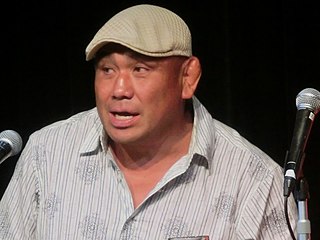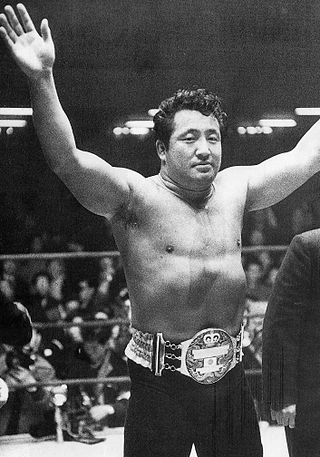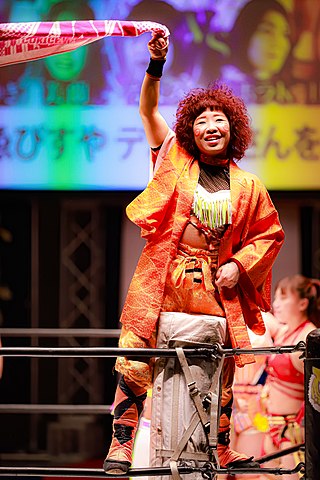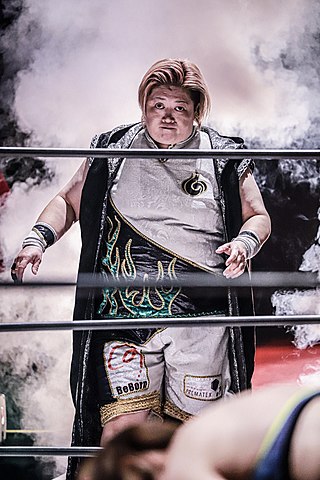Related Research Articles

Puroresu (プロレス) is a Japanese term used for professional wrestling in and outside of Japan. The term comes from the Japanese pronunciation of "professional wrestling", which in Japanese is abbreviated to “puro” & “resu”. The term became popular among English-speaking fans due to Hisaharu Tanabe's activities in the online Usenet community. Growing out of origins in the traditional American style of wrestling, it has become an entity in itself. Japanese pro wrestling is distinct in its psychology and presentation of the sport and how it functions based on Japanese culture. It is treated closer to a legitimate competition, with fewer theatrics; the stories told in Japanese matches are about a fighter's spirit and perseverance. Pro wrestling in Japan led to the development of shoot wrestling and has been closely related to mixed martial arts (MMA) starting with Shooto and Pancrase, organizations which predate the Ultimate Fighting Championship (UFC), along with influencing subsequent promotions such as RINGS and PRIDE. It is common for pro wrestlers and mixed martial artists in Japan to cross over.

Wrestle Association R was a Japanese professional wrestling promotion founded and run by Genichiro Tenryu as the successor to Super World of Sports, and which lasted from 1992 to 2000. The promotion initially established as Wrestle and Romance in 1992 and had very few regular contracted workers; instead most of the workers were either freelance or employed in other promotions. Because of this WAR ran many all-star cards. It had inter-promotional feuds against New Japan Pro-Wrestling, Frontier Martial-Arts Wrestling, the new Tokyo Pro Wrestling, and UWF International. WAR also continued, albeit in a loose fashion, SWS's old working agreement with the World Wrestling Federation, when they backed the WWF's first Japanese tour, in 1994.

Kazuyuki Fujita is a Japanese professional wrestler, former mixed martial artist and freestyle wrestler, currently signed to Pro Wrestling Noah, where he is a one-time GHC Heavyweight Champion. He has most recently fought in Road FC, but is also known for his work in the PRIDE Fighting Championships, K-1, Rizin Fighting Federation, and World Victory Road.
Naoki Sano is a Japanese retired professional wrestler and former mixed martial artist most notable for being the generational rival of legendary Japanese pro wrestler Jushin Liger. During the last years of his career he went by the name Takuma Sano.
Mitsuo Momota is a semi-retired Japanese professional wrestler and executive, known for his work in the Japanese promotions All Japan Pro Wrestling and later in Pro Wrestling NOAH. He is the son of wrestler Rikidōzan.

Kazunari Murakami is a Japanese professional wrestler and retired mixed martial artist currently working for Pro Wrestling Noah. Murakami is best known for his work in New Japan Pro-Wrestling (NJPW) during the late 1990s and early 2000s, where he primarily competed as a member of the villainous Makai Club stable. Aside from pro wrestling, Murakami was also part of the first fight in PRIDE history, defeating John Dixson by submission in 1997.

Hiromichi Fuyuki was a Japanese professional wrestler and promoter better known by his ring name Kodo Fuyuki best known for his time in All Japan Pro Wrestling (AJPW), Frontier Martial-Arts Wrestling (FMW), New Japan Pro-Wrestling (NJPW), Wrestle Association R (WAR) and other Japanese and international promotions during the 1980s and 1990s as the leader of 6-man tag team Fuyuki-Gun with Gedo and Jado.

Professional wrestling in Japan has existed for several decades. The first Japanese person to involve themselves in catch wrestling was former sumo wrestler Sorakichi Matsuda. There were subsequent attempts before and after World War II to popularize the sport in Japan, but these generally failed until the advent of its first big star, Rikidōzan, in 1951, who became known as the "father" of the sport. Rikidōzan brought the sport to tremendous popularity with his Japanese Wrestling Association (JWA) until his murder in 1963. Following his death, professional wrestling thrived, creating a variety of personalities, promotions and styles. It has also created a mass of other cultural icons in Japan including: Antonio Inoki, Giant Baba, Jyushin "Thunder" Liger, Tiger Mask, Keiji Mutoh/The Great Muta, Mitsuharu Misawa, and Kenta Kobashi among others. Throughout the years, several promotions have opened and closed, but a few have persisted to remain the most popular and thriving companies: New Japan Pro-Wrestling is currently considered by many as the top promotion.
The Ikki Kajiwara Memorial Show was a Japanese professional wrestling event held in 1988, and again in 1997, in memory of author and manga writer Ikki Kajiwara. Although Kajiwara was not directly connected to puroresu wrestling, he is credited with having created the Tiger Mask character, which has been a popular masked wrestler portrayed by four different Japanese wrestlers in All-Japan Pro Wrestling and New Japan Pro-Wrestling since the early 1980s.
The Big Egg Wrestling Universe was a professional wrestling event held by All Japan Women's Pro-Wrestling (AJW) inside the Tokyo Dome in Tokyo, Japan on November 20, 1994 and was attended by 32,500 fans. However, some sources claim the event was attended by over 42,000 fans. The event generated approximately $4 million in revenue from ticket sales, as well as $1.6 million in merchandise sales.

Kaori Yoneyama is a Japanese professional wrestler, working as a freelancer on the Japanese independent circuit. Yoneyama started her career in 1999, working with the JWP Joshi Puroresu promotion. During the following years, she became a one-time JWP Openweight Champion, a one-time JWP Junior Champion, a five-time JWP Tag Team Champion, a one-time Pure-J Openweight Champion and a three-time Daily Sports Women's Tag Team Champion. Notable titles she has held outside of JWP include All Japan Women's Pro-Wrestling's AJW Championship and AJW Tag Team Championship, Ice Ribbon's International Ribbon Tag Team Championship, Big Japan Pro Wrestling's BJW Women's Championship, and NEO Japan Ladies Pro Wrestling's High Speed Championship. In July 2011, Yoneyama announced that she would be ending her twelve-year career the following December. After a retirement tour, which took Yoneyama not only across the Japanese independent circuit, but also to the United States, she announced during her retirement ceremony that she had changed her mind and decided to continue her career. In January 2013, Yoneyama quit JWP to become a freelancer, working for promotions such as Gatoh Move Pro Wrestling, Oz Academy, Union Pro Wrestling and World Wonder Ring Stardom.

JWP Joshi Puroresu, also known as JWP Project or simply JWP, was a Japanese joshi puroresu promotion, founded in 1992 as a splinter promotion of Japan Women's Pro-Wrestling. Celebrating its 25th anniversary at the time of its folding in 2017, JWP was the oldest joshi puroresu promotion in Japan and its Openweight Championship was the oldest championship in all of joshi. Command Bolshoi, who had worked for the promotion since the beginning, served as the final president of JWP. The promotion's slogan was "Pure Heart, Pure Wrestling".
The JWP Junior Championship was a women's professional wrestling championship owned by the JWP Joshi Puroresu promotion. It was introduced on June 16, 1995, when Candy Okutsu defeated Hiromi Sugou and Hiromi Yagi in a three-way match to become the inaugural champion.
Eriko Tsuchiya is a Japanese retired professional wrestler better known by the ring name Shark Tsuchiya (シャーク土屋). She spent most of her career working for Frontier Martial Arts Wrestling.
Kaori Nakayama (中山香里) is a retired Japanese professional wrestler, who spent much of her career for Frontier Martial-Arts Wrestling.

Yoshihito Sasaki is a retired Japanese professional wrestler, best known for his time with the Japanese professional wrestling promotions Big Japan Pro Wrestling (BJW) and Pro Wrestling Zero1 (Zero1).

Kuuga is a Japanese professional wrestler currently working as a freelancer and is best known for his time in the Japanese promotions Osaka Pro Wrestling and Dotonbori Pro Wrestling. A masked wrestler, Kuuga is greatly influenced by lucha libre, and because of this, he has followed Mexican tradition for masked wrestlers, so his real name is not a matter of public record.
Samurai TV 15th Anniversary Indie no Oshigoto Presents New Year's Eve Pro-Wrestling 2011 was a Japanese professional wrestling event promoted by the New Year's Eve Pro-Wrestling Committee, comprising multiple independent wrestling promotions. The event, held on December 31, 2011, at Korakuen Hall in Tokyo, Japan aired live on Fighting TV Samurai.

Kaoru Ito is a Japanese professional wrestler and former mixed martial artist currently working as a freelancer and is best known for her tenure with the Japanese promotions All Japan Women's Pro-Wrestling and JWP Joshi Puroresu.
References
- 1 2 3 4 5 6 7 8 9 10 11 12 13 14 15 16 17 18 19 20 21 New Japan Pro-Wrestling (Producer) (2003-05-15). Rikidozan - Puro Founder (DVD). Japan: Wrestleholic2001.com. Archived from the original on 2011-07-18.
- 1 2 3 4 5 6 7 8 9 10 11 12 13 14 "Rikidozan Memorial Show 1996". Misc. Events. ProWrestlingHistory.com.
- 1 2 3 4 5 6 7 8 9 10 11 12 13 14 "Rikidozan Memorial Show 1996 vom 30. Juni 1996" (in German). GenickBruch.com. Archived from the original on 2013-01-24.
- 1 2 3 4 5 6 7 8 9 10 Lorefice, Mike (2000). "Quebrada News Archive: Multi-promotional". Multi News Puroresu News Archive. Quebrada.net.
- ↑ Puroresu Dojo. "1996". The History of Puroresu: 1990s. Puroresu.com. Archived from the original on 2001-02-11.
- ↑ Puroresu Dojo (2008-06-30). "This day in Puroresu History". PuroresuMania.com. Archived from the original on 2016-03-03.
- ↑ Gamble, Ron (2003-06-16). "Official 411 Wrestling Almanac For June (Part 2)". 411mania.com.
- 1 2 3 4 5 6 7 8 9 New Japan Pro-Wrestling (Director) (2000). Rikidozan Memorial Show #2 (VHS). Yokohama, Japan: Highspots.
- 1 2 3 4 5 6 7 8 9 Wilson, Kevin (2007-09-02). "Rikidozan Memorial Show 2000". Reviews. PuroresuCentral.com. Archived from the original on 2011-07-20.
- 1 2 "SLAM! Wrestling International -- 2000: The Year-In-Review in Japan". SLAM! Wrestling International. SLAM! Sports. 2001-01-22. Archived from the original on January 15, 2013.
- 1 2 "BAHU's FMW News". BAHU's FMW World. FMWwrestling.us. 2000.[ permanent dead link ]
- 1 2 "Hayabusa's Results". BAHU's FMW World. FMWwrestling.us. 2001.
- 1 2 3 4 5 6 7 8 9 10 11 12 "Rikidozan Memorial Show 2000". Misc. Events. ProWrestlingHistory.com.
- 1 2 3 4 5 6 7 New Japan Pro-Wrestling (Producer) (2000-04-04). Rikidozan Memorial II (VHS). Yokohama, Japan: WrestlingEmporium.com.
- ↑ Cobo, Digable James (2002). "Rikidozan Memorial II". Reviews. Buster Time Magazine 2.0.
- 1 2 3 4 5 6 7 8 9 10 11 12 PWInsider.com (2009-03-11). "Today in Wrestling History, 3/11: Sting Wins Big, More". ImpactWrestling.com.
- ↑ Singh, Matt (2003-11-21). "NOAH Rikidozan memorial show". International Scene News. Wrestling101.com.
- ↑ Pro Wrestling Noah (2006). "Chronicle/History: 2000". Chronicle/History. Noah-USA.cc. Archived from the original on 2013-10-24.
- 1 2 Phillips, James (March 2000). "March 11". News. Japanese Womens Wrestling. Archived from the original on 2000-11-19.